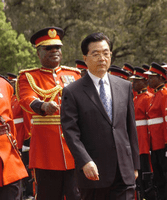When I was in Ecuador two years ago, a businessman named Ivan excoriated me about the limits Washington placed on business that local fishing firms could do with the U.S. The conversation went on for a while, but when it ended, he promptly introduced me to his teenage daughter and pleaded with me to speak to her so that she could practice her English. In fact, she spoke eloquently and fluently, but the irony was no less striking: The gringos to the north offered little opportunity to Latin America, but the best chance for Ivan's daughter to succeed -- leaving for America -- required English.
These days the situation has changed. Public schools in Ecuador still teach English, but parents who can afford private schools are opting for something different. The children of the country's elite now learn another language, one that perhaps offers more opportunities for the future: Chinese.
The shift is decades in the making, but since the turn of the millennium, China's overtaking of the global south has grown more concerted, more effective, and, in many ways, more disconcerting. It has been most marked in Latin America and Africa, and a new book brings the reality into sharp focus. For "China's Safari: On the Trail of Beijing's Expansion in Africa," French journalists Serge Michel and Michel Beuret crisscrossed the continent, revealing in the process just how the Chinese are colonizing the continent so much more effectively than the American or British empires of the past. Their method? Little ideology, all profit.

